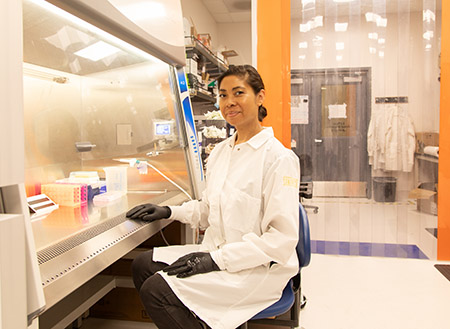Campus News
Mapping the mind
Ph.D student Asia Anderson focuses on the development of brain machine interfaces to model and study the development of the human brain, specifically those with neurodegenerative disorders.


Asia Anderson knew she wanted to become a doctor from a very young age. She recalls playing “hospital” with her pets as patients, or “healing” trees outside as a child. Now as a chemistry Ph.D. student in the Biomedical Sciences and Engineering Program at UC Santa Cruz, Anderson studies brain mapping of neurodegenerative diseases.
Her research focuses on the development of brain machine interfaces (BMI) that utilize a High Density Array for neural network sensing. Her long term goal is to map out spike patterning spore medical implications so that in the future, doctors know how to redirect non neurotypical firing patterns to avoid neurodegenerative diseases.
Anderson’s father was diagnosed with dementia and cancer when she was 16 years old. His diagnoses and eventual passing motivated Anderson to pursue a deeper understanding of neurodegenerative disorders.
“I would go with him to the doctor all the time and I watched his cognitive reasoning decline within the course of two years,” Anderson said. “I was like, what happened? Why? What is dementia?”
Anderson’s academic journey began on a different path. When she was in community college, Anderson sought a career in nursing, but her professors encouraged her to study chemistry—first at Cal Poly Humboldt and then to pursue a Ph.D. at UCSC.
“Dr. David Dubrow and Dr. Ralph Reiner, at the community college level, taught me that there’s many different types of doctors, not just a medical doctor, and that I could still help with medical advances without being a physical physician,” Anderson said. “And that’s what got me onto the track of chemistry, because they said that chemistry was like a language. That language really clicked with me.”
Anderson arrived at UC Santa Cruz with the Eugene Cota-Robles fellowship. The prestigious, merit-based fellowship, named in honor of Cota-Robles’ contributions towards advancing minority achievement at the University of California,is awarded on a competitive basis to first-year graduate students who have overcome significant social or educational obstacles to achieve a college education, and whose backgrounds equip them to contribute to intellectual diversity among the graduate student population. The Cota-Robles fellowship provides a stipend during the regular academic year plus payment of all university fees.
“The graduate division staff have been supportive of me every step of the way and go above and beyond, Anderson said. “They have monthly check-ins with me, keep me on point with my goals, and really take it upon themselves to make sure that I always have everything that I need.”
While managing her responsibilities as a full-time Ph.D. student, Anderson also balances life as a mother to her 9-year-old son. She expressed gratitude for the support she has received, such as access to the Redwood Free Market and the dining halls.
“I really like how convenient UC Santa Cruz has been making my experience,” she said. I don’t think I’ve ever worked with a facility that has been so accommodating.”
Anderson also serves as a mentor for UCSC’s Black Academy, a first year extended orientation program designed to support and guide students in their transition to the university, as well as provide a general introduction to the people and resources that will help new students flourish.
Anderson’s work as a Black Academy mentor stems from her own experience feeling underrepresented in the university setting. During her undergrad at Cal Poly Humboldt, Anderson was one of three Black students to graduate with a degree in chemistry out of about 80 students. At UCSC, she is one of only two Black chemistry Ph.D. candidates.
“It’s important for grad students to see that we’re here,” she said. “The more that we are visible, the safer others will feel to go for it and not give up.”
One of the most rewarding aspects of being a Black Academy mentor, Anderson says,is building friendships and cultivating a mentor/mentee relationship.
“Even after the mentorship is over, I still see my friends,” she said. “The role reverses because not only was I mentoring them, but then they become my friends and it’s like ‘oh yeah, you’re actually helping to mentor me because I can also talk to you about what’s going on with me.’”
In her free time, Anderson likes exploring Santa Cruz with her peers, surfing, and discovering new restaurants in town.